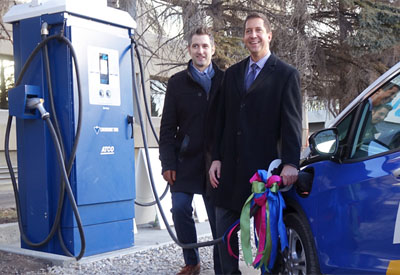ATCO Partners with FLO to Unveil Alberta’s First Electric Vehicle Charging Corridor

ATCO, Alberta’s leading energy and infrastructure provider, together with FLO, Canada’s leader in electric vehicle (EV) charging solutions, have announced the deployment of three fast-charging stations in Alberta’s major cities – the first corridor of its kind in the province. This initiative is made possible by a partnership with Canadian Tire Corporation and Natural Resources Canada.
“Our energy landscape is changing, which is why we are investing in infrastructure that empowers our customers to take full advantage of these exciting emerging technologies,” said Wayne Stensby, Managing Director, Electricity for ATCO. “Not only did our people lend their local expertise in connecting these cutting-edge charging stations to the grid, but ATCO’s retail energy business is providing the costeffective, reliable electricity needed to give our customers peace of mind as they commute between Alberta’s three largest cities.”
Chargers are currently being installed at Canadian Tire Gas+ locations in Calgary, Red Deer and in greater Edmonton. The stations will be operational in early 2018, and are conveniently located close to Highway 2 exits and near amenities like rest areas, shops or restaurants. Each location will be powered by ATCOenergy and equipped with a Level 3 fast-charging station and a dual Level 2 charging station to accommodate all types of electric vehicles. The corridor will not only make it easier for electric vehicles to travel between the province’s largest cities, but will also make it easier to travel in and out of Alberta.
“The availability of reliable charging infrastructure is a key factor in driving electric vehicle adoption,” said Louis Tremblay, President and CEO of FLO. “Although the EV market is still small in Alberta, the development of a charging network is a strong catalyst to support electric mobility, by making short and long-distance travel easier and reducing range anxiety.”
This exciting project was made possible in part by Natural Resources Canada through its Electric Vehicle and Alternative Fuel Infrastructure Deployment Initiative, a $62.5-million federal commitment made in Budget 2016 to fund new fast-charging infrastructure for EV charging stations along key transportation corridors in Canada.
“Our government continues to support initiatives that will help build a clean economy, create wellpaying jobs and achieve our climate change goals,” said Jim Carr, Canada’s Minister of Natural Resources. “These electric vehicle charging stations will give Alberta drivers cleaner options in the transportation sector and help pave the way for a low carbon future.”
These charging stations will be connected to the FLO network, Canada’s largest EV charging network with more than 4,000 charging stations from coast to coast, including 150 fast-charging stations. There are currently more than 1,000 battery-electric and plug-in hybrid vehicles registered in Alberta, making it the fourth-largest EV fleet among Canadian provinces after Quebec, Ontario and British Columbia.











![Guide to the Canadian Electrical Code, Part 1[i], 26th Edition– A Road Map: Section 56](https://electricalindustry.ca/wp-content/uploads/2022/11/Guide-CE-Code-2.png)



